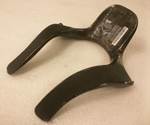Forging variations
Developed in parallel to the Duqueine Group’s (Massieux, France) MFP process, the high-pressure molding process used by Lentilly, France-based Carbone Forgé is described by Vincent Duqueine as “enabling forging of composites, similar to that done with metals.”
Developed in parallel to the Duqueine Group’s (Massieux, France) MFP process, the high-pressure molding process used by Lentilly, France-based Carbone Forgé is described by Vincent Duqueine as “enabling forging of composites, similar to that done with metals.”
Carbone Forgé describes itself as part of a group of European aerospace companies that is focused on improving the understanding of in-mold behavior of composite materials and simulating that behavior to create one-piece parts with complex geometries. In U.S. patent 6,884,379 B1, Vincent describes it as similar to the MFP process in that it uses prepreg between matched metal molds, but unlike his brother’s process, it does not use prepreg bundles. Like the Duqueine Group’s MFP process, however, the Carbone Forgé method also works with thermosets and thermoplastics to produce aerospace components and parts for sporting goods and other industries, including bicycle parts for Look Cycle International (Nevers, France). Carbone Forgé uses a proprietary mandrel made from “fusible core” washout material.
How the two brothers’ companies market their processes also differs widely: Vincent, at Carbone Forgé, works more with fabricators to license and adapt his process to their production needs, while Gilles has focused the Duqueine Group toward direct mass manufacturing.
The Duqueine Group’s VP/business development manager, Jérôme Aubry, who has worked with the brothers for many years, says the Carbone Forgé process works better with flat and long parts. For hollow parts, it incorporates meltable mandrel technology, which Aubry does not see as practical for the high-volume parts pursued by the Duqueine Group.
Related Content
-
Carbon fiber, bionic design achieve peak performance in race-ready production vehicle
Porsche worked with Action Composites to design and manufacture an innovative carbon fiber safety cage option to lightweight one of its series race vehicles, built in a one-shot compression molding process.
-
Industrializing additive manufacturing in the defense/aerospace sector
GA-ASI demonstrates a path forward for the use of additive technologies for composite tooling, flight-qualified parts.
-
Plant tour: Airbus, Illescas, Spain
Airbus’ Illescas facility, featuring highly automated composites processes for the A350 lower wing cover and one-piece Section 19 fuselage barrels, works toward production ramp-ups and next-generation aircraft.



